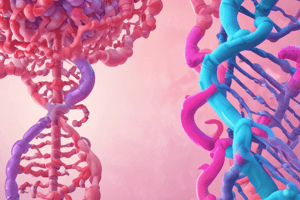Podcast
Questions and Answers
What is the role of somatic mutations in tumors?
What is the role of somatic mutations in tumors?
- They affect the readability of code (correct)
- They are inherited
- They do not alter the function of genes (correct)
- They alter the function of genes
Predictive testing is offered for class 3 mutations and below.
Predictive testing is offered for class 3 mutations and below.
False (B)
What are SNPs generally associated with in cancer risk?
What are SNPs generally associated with in cancer risk?
- High risk of cancer
- Small increase in cancer risk (correct)
- Guaranteed predisposition to cancer
- No cancer risk
What is the significance of RAD51C and RAD51D variants?
What is the significance of RAD51C and RAD51D variants?
Which gene mutation is associated with a high risk of cancer during a lifetime?
Which gene mutation is associated with a high risk of cancer during a lifetime?
What is the inheritance chance of a pathogenic variant in offspring?
What is the inheritance chance of a pathogenic variant in offspring?
FHx has no implications for cancer risk management.
FHx has no implications for cancer risk management.
What is the founder effect?
What is the founder effect?
What is associated with Ashkenazi Jewish ancestry regarding cancer?
What is associated with Ashkenazi Jewish ancestry regarding cancer?
Which cancer types may be associated with hereditary mutations in MMR genes?
Which cancer types may be associated with hereditary mutations in MMR genes?
What does dMMR stand for?
What does dMMR stand for?
Flashcards are hidden until you start studying
Study Notes
Hereditary Cancer Syndromes
- Somatic mutations occur in tumors and do not alter gene function; predictive testing is not available for class 3 and below mutations.
- SNPs are prevalent across cells and may slightly increase cancer risk; future trends include polygenic risk assessments that incorporate well-known SNPs along with monogenic assessments.
- Variants affecting genes like RAD51C and RAD51D show moderate cancer risk and are tested in isolation.
- Polygenic risk assessments may influence penetrance for moderate risk genes alongside monogenic variations, anticipated to be available soon.
- High penetrance genes, such as BRCA1, significantly increase lifetime cancer risk and impair gene function.
Cancer Risk and Family History
- Less likely to reach adulthood or reproduce if severe variants manifest early; prevalence of variants may exceed 1%.
- Some cancer types and age are significant when predicting pathogenic variant likelihood; DNA repair and MMR pathways play crucial roles.
- Genes associated with various cancers include those related to homologous recombination and MMR pathway, notably linked with breast, prostate, and gastric cancers.
- A family history (FHx) elevates cancer risk management urgency, especially regarding BRCA2.
- 50% inheritance chance for pathogenic variants; importance of tracing lineage, particularly for female offspring.
Genetic Ancestry and Founder Effect
- Small populations may have higher prevalence of pathogenic variants due to limited genetic mixing.
- Ashkenazi Jewish ancestry has heightened BRCA1 and BRCA2 variant carriers: 1 in 40 compared to 1 in 500 in the general population.
- Incidence of breast and ovarian cancer increases likelihood of a familial pathogenic variant, especially in young adults.
Cancer Histology and Genetic Associations
- Genes can be histological indicators; for example, CDH1 is associated with invasive lobular cancer, but not invasive ductal cancer.
- Certain gene expressions indicate cancer subtype risk; absence of specific proteins can signal potential pathogenic variants.
- Co-existent mutations, like BRAF, assist in assessing likelihood of MMR functionality loss and determine necessity for family cancer center referrals.
Mismatch Repair (MMR) and Cancer Testing
- MMR proteins are critical for detecting and correcting mutations; deficiency elevates neoplasia risks.
- Individuals with colorectal cancer (CRC) may undergo gene testing related to high polyp and CRC risks.
- For breast cancer patients, a panel of genes linked to increased breast cancer risk may be offered, with an emphasis on younger patients benefiting from early detection strategies.
- Evidence suggests a survival advantage for women diagnosed with MMR tumours at a younger age.
Studying That Suits You
Use AI to generate personalized quizzes and flashcards to suit your learning preferences.



